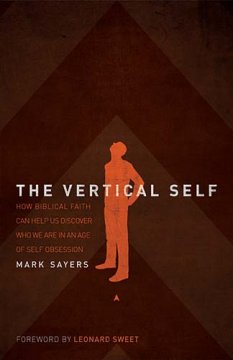 Mark Sayers’ second book, The Vertical Self, further develops the theme of his earlier work, The Trouble with Paris, by emphasising that only a deep and passionate relationship with Jesus can save us from falling prey to the whims and whispers of our culture of consumerism.
Mark Sayers’ second book, The Vertical Self, further develops the theme of his earlier work, The Trouble with Paris, by emphasising that only a deep and passionate relationship with Jesus can save us from falling prey to the whims and whispers of our culture of consumerism.
The book is generally aimed at the young adults of Generation Y. This generation is often known to be one that is characterised, at least in part, by self-centredness and a sense of entitlement. What makes me both sad and angry is that this level of self-centredness is almost equally characteristic of many Christians who really live no different to the rest of the world. What a far cry this is from the Christians of the 1st century. Author Robert Wilken says that the early Christians often did not have an answer to the philosophical attacks thrown at them by the pagans of the day. But that wasn’t how they won the Roman Empire. They won the Empire by the quality of their lives, to the extent that by the time Constantine made Christianity the State religion early in the 4th century, half the Empire was Christian. It is a tragedy of modern-day Christendom that much of the church has nowhere near that level of influence and impact. An example of this is seen when Sayers reveals the seduction and confusion that many Christian leaders are exposed to, leading to them “unconsciously starting to confuse their calling with self-promotion as they were lured into the cult of cool”.
It is difficult to review this work without wanting to quote large slabs of it; such is its importance to and insightfulness of the malaise of the 21st century church. Like the frog placed in cold water that is slowly being brought to the boil, much of the church is not even aware that it is being held captive more to the culture of the day than to the liberating life and message of Jesus. To this end, Sayers makes the point that “in earlier centuries, the belief that humans were made in the image of God was…the cornerstone upon which identity was built”. No longer is this the case today though. Sayers believes that “we are now in an age where, for the first time since the birth of the church, the vertical self is not the dominant influence on Western culture’s understanding of self”.
Sayers defines the vertical self as a combination of Judaeo-Christian belief in God-given identity and a Greek belief in virtuous living. It explains the way that identity is developed by being part of a greater order. Further on, he says that the idea of the vertical self is a worldview that leads to a belief in the eternal, the desire to cultivate one’s spirituality so that one moves upward on the path toward becoming more like God. Compare this to the horizontal self, where we try to gain our sense of identity from our peers and from trying to measure up to what is sexy, cool, and glamorous. In fact, this book is divided into chapters that take into account such cultural phenomena as the social self of sexy, the social self of cool, and the social self of glamorous, all of which are ways we act out an image of ourselves. This is what Sayers calls our public image, and it is what many Christians now base their sense of self on instead of basing it on the fact of being made in the image of God.
The message that Sayers conveys throughout this book is one which I believe needs to be the core message of the church to the 1st world; that is, that only more intimacy with Jesus will save us from being sucked into the lie that the lure of our current culture will bring us the life we have always wanted. Tragically, it is a message that the church needs to hear just as much as the rest of the world.
The roots of the malaise of the horizontal self go deep indeed, so deep in fact that they speak to the very core of who we are as human beings. One of Sayers’ most profound insights is that “in a secular culture…religion, spirituality, tradition, and culture cannot tell a wider story that offers the individual a sense of place and meaning, hence the creation of the horizontal self and the creation and cultivation of a public image being paramount”. The meta-narrative of the Bible is no longer the foundation of our culture.
Sayers goes on to say that, in our culture, we no longer try to find ourselves. Instead we act. Identity is exchanged for imagery. Said in this way, Sayers’ message reveals Jesus’ message of building one’s house on the rock of the vertical self rather than on the shifting sands of the horizontal self as being incredibly relevant to our 21st century Western culture. For those who are tired of the failed promises of the horizontal self, Jesus once again shows himself to be the answer. The age-old words, ‘come to me all you who are weary and heavy-laden and I will give you rest’ whisper across the ages to a culture lost in a sea of failed promises and long-forgotten ideals. The tragic result of a culture lost in the sea of the horizontal self is a life that gradually tears at our psyches.
An interesting observation that Sayers makes in this book, and one with which I agree, is that, often, the more you embed your identity in a vertical sense of self, the more people living under a horizontal self will see something I you that will draw them to you. The vertical self can be recaptured when we commit ourselves to the God who has set eternity in the human heart (Ecclesiastes 3:11).
Overall, the main ideal that Sayers is calling people to in The Vertical Self is a mark of character that seems so old-fashioned that even for many Christians it conjures up negative connotations. That mark of character is holiness. Holiness, as Sayers describes it, is when we are the people God created us to be. It is wholeness, centredness and connectedness. Christians have often given holiness a bad name. We have given off an image of holiness as being closer to legalism than grace. We have given off the image that a holy person is someone who doesn’t swear, doesn’t smoke, and doesn’t have extra-marital sex. All of these things may indeed be marks of a holy person, but they do not by any means define holiness on their own. Ultimately a holy person is a person of grace. And the best example of a holy person I know is Jesus. Being God in person, we are told in the Old Testament that we are to ‘be holy as I am holy’. Then in John’s gospel, we are told that grace and truth came through Jesus. The irony of how holiness is often viewed compared to the life of Jesus is seen in the fact that Jesus was the one who spoke out against the Pharisees for their excessive legalism, and he was the most holy person who ever lived.
Having said all of the above, I did not find myself agreeing with all of what Sayers was bringing across. For instance, he says that, in a culture ensconced in the view of the horizontal self, when we see public figures found out, we chide them for being caught, for not being able to keep up the game of illusion. However the recent example of Tiger Woods would seem to contradict this view. The case of Woods’ infidelity is one where I believe the huge media interest was not because he failed to keep up an illusion, but because he really was living a lie, especially as he claimed to be a family man. And Australians still don’t buy in-authenticity.
That criticism aside, The Vertical Self is a must-read for church leaders today, particularly those in ministry to Generation Y. For me, the marvel of this book is seen in its final paragraphs. Sayers sees this book as his gift to us, the readers. In words that could have been peened by C.S. Lewis or Philip Yancey, he describes his hope that this gift will “work as a key, opening a doorway out of the cramped, stale confines of the horizontal self, filling you with the gusts of fresh air perfumed with the scent of eternity”.
It is only when we are enmeshed in Jesus, in the life of the vertical self, that we are able to resist the lies and deceptions of our culture which tell us that we can have the life we have always wanted and we can have it now. The Vertical Self is a wise and timely book that speaks volumes not just to our culture, but to the culture of the church in the 21st century. Sayers’ thinking has matured since The Trouble with Paris. I don’t know Sayers personally, but this latest book reveals a maturity that I believe is borne only out of a deepening faith and passion for Jesus and His ways – a life lived in the vertical self. That is what makes it so authentic.
 Many people will by now have seen the video put together by a handful of Christians urging people to vote on certain issues, and particularly to not vote Green. The main people involved include some from the Christian Democrats.
Many people will by now have seen the video put together by a handful of Christians urging people to vote on certain issues, and particularly to not vote Green. The main people involved include some from the Christian Democrats.
 Mark Sayers’
Mark Sayers’ 




